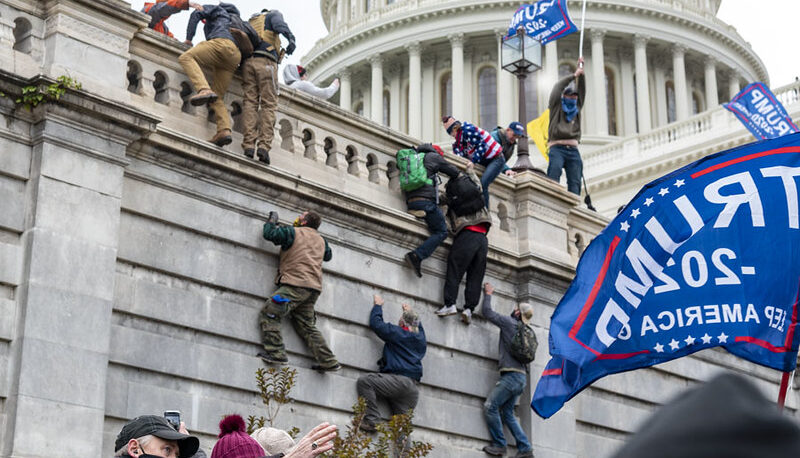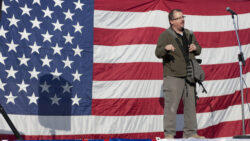The House Oversight Committee held a hearing Wednesday on white supremacism and the role of militia groups amid the current rise of right-wing extremism—a topic fresh on the minds of lawmakers who sat in the U.S. Capitol on Jan. 6 as members of the Oath Keepers and Three Percenters stormed the building. Rep. Andy Biggs, however, thought the focus of the hearing was redundant, asking his colleagues: At what point would the committee look into violence committed by anti-fascist groups?
“Now, this is the fifth hearing that this subcommittee has held on confronting white supremacy,” the congressman from Arizona said. “Over the summer, we saw riots in both of our cities, small businesses were destroyed, shops looted, churches set on fire, yet we have not had a single hearing on antifa and its violent activities.”
Biggs’ reasoning that the committee should focus its efforts on antifa—Republicans preferred term to describe anti-fascist groups—was that one news source had described the Oath Keepers as a “loosely knit” organization, and another news outlet described antifa as “a loose affiliation of local activists.” “Loose,” then, was Biggs’ key term in determining whether a group should be the focus of a committee hearing—never mind extremist ideology or history of violent acts.
“It seems to me, Mr. Chairman, that we ought to be looking at both of these groups. If you want to look at Oath Keepers, let’s look at antifa too and see what they’ve done. We’ve had unrest around this country for more than a year,” Biggs said in apparent reference to the Black Lives Matter protests that erupted across the country following the brutal police killing of George Floyd.
In spite of unrest that followed some protests, Black Lives Matter protests remained overwhelmingly peaceful throughout 2020. Nevertheless, right-wing pundits and politicians have fearmongered about “antifa” and Black Lives Matter descending upon American cities, turning them over to anarchy.
Biggs’ unwillingness to examine the violence committed by pro-Trump militia groups on Jan. 6 and his desire to deflect focus onto the favorite boogeymen of the right may have something to do with his own connections to right-wing extremist groups—and the role he played in supporting the so-called Stop the Steal movement.
Ali Alexander, the far-right activist behind the so-called Stop the Steal movement, said he schemed up the massive Jan. 6 rally with three GOP lawmakers: Reps. Mo Brooks of Alabama, Paul Gosar of Arizona—and Biggs. The Stop the Steal movement, aimed at overturning the 2020 election results by promoting the big lie that the election was stolen from former President Donald Trump through fraud, had attracted anti-government extremist militia groups, including the Oath Keepers and Three Percenters. On Jan. 6, Alexander and the three congressmen were determined to prevent Congress from certifying the Electoral College votes.
“We four schemed up of putting maximum pressure on Congress while they were voting, so who we couldn’t lobby, we could change the hearts and the minds of Republicans who were in that body, hearing our loud roar from outside,” Alexander said in a since-deleted Periscope video.
Those Trump loyalists, of course, listened to increasingly extreme rhetoric from speakers before heading to the Capitol at Trump’s behest “to fight like hell.” Receiving accolades from Trump that day was his personal attorney Rudy Giuliani, who urged the crowd to engage in “trial by combat.”
Biggs had supported the Stop the Steal movement prior to Jan. 6, but in the days following the insurrection, he denied working with Alexander, supporting the Stop the Steal movement, or of having any knowledge of a rally before the electoral vote. He then went on to push the conspiracy theory that “antifa or BLM type folks” stormed the Capitol.
The congressman’s determination to keep Trump in office shouldn’t come as a surprise. In October 2019, as the Democrat-led House impeachment team held a closed-door hearing with a top Pentagon official, Biggs was among the more than two dozen Republican lawmakers who stormed the secure hearing room in protest of the impeachment investigation, threatening national security in the process.
As far back as 2015, Biggs appeared at an event with Oath Keepers founder Stewart Rhodes, at which Rhodes called for the execution of Sen. John McCain, telling the audience, “he should be hung by the neck until dead.” Instead of defending his Senate colleague, Biggs sat silently alongside Rhodes, later claiming that “he didn’t know who or what the Oath Keepers are,” and that speaking up would have infringed on Rhodes’ “free-speech rights.”






